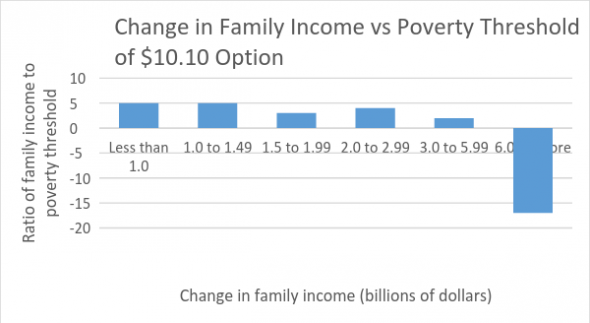Why David Brooks Is Wrong on Minimum Wage
He opposes raising it but uses bad math and incomplete research.
New York Times columnist David Brooks is many liberals’ favorite conservative—and also one of the most frustrating. His recent column on the issue of raising the minimum wage, which many Democrats here favor but Republicans oppose, is a case in point.
The article contains many of the elements that make Brooks appealing. His choice of research reports on the minimum wage seems fair, not deliberately biased toward one side or the other. The online version of the column includes links to most of the studies, allowing readers to check whether they were fairly summarized.
Milwaukee readers would be well served if our local newspaper insisted on the same practices from its op-ed writers. Too often they are allowed their own set of facts, not just their own set of opinions.
The column also illustrates Brooks’ typical desire for balance. He notes that, “Once upon a time there was a near consensus among economists that raising the minimum wage was a bad idea,” but that more recent research has caused that consensus to fall apart. However, in quantifying the shift in consensus, Brooks turns to some odd math calculations.
He writes that “One survey of economists by the University of Chicago found that 59 percent believed that a rise to $9 an hour would make it ‘noticeably harder’ for poor people to find work. But a slight majority also thought the hike would be worthwhile for those now employed.” To his credit, Brooks links to the survey, which asked a panel of research university economists whether they agreed, disagreed, or had no opinion on two statements. The first statement read: “Raising the federal minimum wage to $9 per hour would make it noticeably harder for low-skilled workers to find employment.” The table below summarizes the responses. The survey reports the results two ways: the first gives the percentage that agreed (strongly and not), uncertain, disagreed (strongly or not), and with no opinion. The second (second table shown below) weights the responses by the degree of confidence the economists had in their response.
| Question A: | Strongly agree | Agree | Uncertain | Disagree | Strongly disagree | No Opinion |
| Responses | 0% | 34% | 24% | 32% | 0% | 3% |
| Weighted | 0% | 40% | 22% | 38% | 0% |
In coming up with his figure of 59 percent, presumably Brooks dropped those uncertain or with no opinion, and combined those who strongly agreed with those who agreed, and those who strongly disagreed with those who merely disagreed. While this method leads to a majority agreeing, it does not give 59 percent. Using either the raw or the weighted percentages gives 52 percent. With the second statement the discrepancy is even worse. The statement read, “The distortionary costs of raising the federal minimum wage to $9 per hour and indexing it to inflation are sufficiently small compared with the benefits to low-skilled workers who can find employment that this would be a desirable policy.” The next table shows a breakdown of the responses.
This breakdown hardly fits Brooks’ description of “slight majority.” Far more agreed (or strongly agreed) than disagreed (or strongly disagreed)—81 percent to 19 percent.
| Question B: | Strongly agree | Agree | Uncertain | Disagree | Strongly disagree | No Opinion |
| Responses | 5% | 42% | 32% | 8% | 3% | 3% |
| Weighted | 10% | 52% | 23% | 10% | 6% |
Brooks recognizes that the old consensus among economists on the minimum wage has broken down. What he misses is that a new consensus is forming: that the benefits of a moderate increase in the minimum wage outweigh the costs. His odd mathematics fits his congenital desire to find a middle ground.
Consistent with missing the extent of the consensus shift, he also undercounts the benefits of a minimum wage hike. He refers to a study by the Congressional Budget Office (He doesn’t offer a link to the study. It is here.):
A study by the Congressional Budget Office found that a hike to $10.10 might lift 900,000 out of poverty but cost roughly 500,000 jobs.
The above quote leaves the impression that 900,000 people would gain while 500,000 would lose for a net of 400,000. The CBO report itself, however, makes it clear that 900,000 is the net decline in people in poverty and includes the job loss. Here is what the CBO says:
Under current law, CBO projects, there will be roughly 45 million people in families whose income is below the poverty threshold in 2016. The $10.10 option would reduce that number by about 900,000, or 2 percent, according to CBO’s estimate. That estimate takes into account both families whose income would increase and move them out of poverty and families whose income would fall and move them into poverty.
In addition, Brooks totally ignores the benefit to families just above the poverty threshold who are struggling to get by. The chart to the right shows the CBO’s estimate of the net change in family income by their ratio to the poverty threshold of raising the minimum wage to $10.10. Note this is a net figure, after estimated job losses and price increases.
For those making more than six times the poverty threshold the price increases dominate. Below that income level, families on average enjoy a net benefit. In addition to lifting some people out of poverty, a moderate increase in the minimum wage helps strengthen the lower end of the middle class under the CBO estimate.
Consider a couple with two children. Both adults are working full-time earning the current the current minimum wage of $7.25. Family income is around $29,000 per year, putting them just above the poverty threshold. An increase to $10.10 would put them at just over $40,000, not rolling in money, but strengthening their hold on the middle class.
Amidst the screaming by both sides, Brooks often seems like a voice of moderation. A number of cities are raising their minimum wages, leading to a battle of anecdotes. When a franchise of Z Pizza announced it would be close because of Seattle’s increase in the minimum wage, the local Fox News jumped on the story as a sign that restaurants would be closing all over Seattle. Now the news that Wisconsin’s Ian’s Pizza would occupy the same space has led to a tone of triumph among supporters of the wage increase. In reality such anecdotes do not tell us much about the effects of raising the minimum wage. We need data.
Brooks’ virtue of looking for the middle position can turn into a vice. It contributes to a blindness both to the change of the economic consensus and to the reasons behind that change. While increasing the minimum wage is hardly a panacea for the problems of poverty and a weakening middle class, it pushes the nation in the right direction. What Brooks seems to miss is that splitting the difference between contrasting viewpoints doesn’t necessarily always lead to truth. In the case of his column on the minimum wage, it leads to mistaken conclusions.
Data Wonk
-
Why Absentee Ballot Drop Boxes Are Now Legal
 Jul 17th, 2024 by Bruce Thompson
Jul 17th, 2024 by Bruce Thompson
-
The Imperial Legislature Is Shot Down
 Jul 10th, 2024 by Bruce Thompson
Jul 10th, 2024 by Bruce Thompson
-
Counting the Lies By Trump
 Jul 3rd, 2024 by Bruce Thompson
Jul 3rd, 2024 by Bruce Thompson






















WE have 57% unemployment in our youth, in Milwaukee, so why do we want to make that worse?
Fact is that the left and Obama has been disaster fro our working class. Look at the facts, 10% reduction in net wealth, fewer full time jobs, more parttime jobs, heavy unemployment for women.
Nothing is better for that class but they have made their campaign contributors rich by creating dollars for them to invest in stock market.
So what are your solutions WCD? I want some policy ideas from you. Enough criticism. All you do is criticism, and it’s always the same exact criticisms. So it’s time for you to share some solutions.
It’s true, youth unemployment is indeed alarmingly high in the inner city and these minimum wage laws will do nothing but hurt those numbers even more. The median household income of a minimum wage earner is decidedly middle class. We’ll be helping far fewer people than many minimum wage raise supporters think we will.
Reducing the income inequality gap is an admirable goal… but earning a bit more income for some while putting others out of work (or preventing them from getting a job) doesn’t seem to equal each other in my mind. As a community, I think it is much better to support people who work and contribute to society than to support people who don’t. That’s the road we’re going down here.
PMD, I know your question was directed at WCD, but lets be honest… you’re never going to get that answer from him. However, here are 5 tenantants to improving our innercity that I think will help our community as a whole as we bring up the quality of life for those at the most difficult levels:
1. Education – restructure MPS to smaller community based school systems based around the neighborhood. This can free up resources to be focused where they are needed most while also creating a sense of community.
2. Family – Focus on community programs to affect the culture that drives people back towards the family unit and all the facets of that idea. Lean on community leaders to speak out and encourage the rebirth of the idea of a strong family unit and personal responsibility.
3. Crime – Enforce and prosecute crimes to their fullest extent. Increase community policing and actually punish people for the crimes they commit
4. Employment opportunities – Encourage employment as young as possible to teach responsibility and provide educational opportunities that can be used later in life. Foster economic growth in the city in areas served by transportation to jobs that can be done by the workers with the skill sets of those living in the inner city (this is where not bumping the minimum wage comes in)
5. Community Involvement – Redirect funds to organizations that support people helping people. It takes everyone… the suburban college educated young professional to the single mother of three with a G.E.D. It takes a village after all.
Thanks AG. I certainly am not expecting him to answer in any meaningful way.
I think most people regardless of political ideology agree with your 5 points. I do. But what’s the fine print? How do you successfully transition MPS into a smaller, community-based school system? How do you drive people back to the family unit? What does increased community policing involve? You’ve got the broad strokes down. The devil is in the details.
You’re very right PMD, the devil is in the details. With that in mind, regarding both this Data Wonk article and tenant 4… I believe raising the minimum wage too high or too fast would have negative consequences that could indeed hurt progress in this area.
Let’s say that’s true, for the sake of argument. Raising the minimum wage too high and too fast would do more harm than good here. How do we reduce the city’s unemployment rate, especially in the African-American community, and produce more jobs that pay a living wage or better? Maybe I’m not paying close enough attention, but the discussion seems to focus mainly on the problems, which pretty much everyone agrees on, and not practical and effective solutions.
There are many answers to the youth unemployment but the left opposes them or is completely incompetent to achieve the, like teaching kids to read. When 4 of 5 in third grade, my wife is third grade teacher, cannot read you have already lost them. One I believe might really help and that is a training wage, for one yea,r for kids, from 15-25, to get them to work on time, develop decent habits, grow up of $5/hr. It would cost the employer more cause they would have to spend time training people. I would have employed two kids in that area.
In the long run the only thing that breaks down segregation or the inner city is to educate and get people jobs. Left hs proved in Milwaukee they can do neither so all they talk about is more failed busing type programs.
The left opposes teaching kids to read? That might be the dumbest thing I’ve ever read in my entire life. Dear lord.
I just love to go on this site and listen to the whining about this horribly stupid person whoa has been investigated more than any or all governors in the country and never found anyhting. Chisholm anted in the worst ay to et even with Walker for Act 10 and he failed and all of you whine. Imagine this stupid person beat the left 3 times.
I agree with Murphy that the Pizza News stories are anecdotal. I also agree that Brooks takes short cuts in his reportage and that he is influenced by his preferences more than he admits. The description of the statistics used by Brooks is also helpful, but I would suggest showing the math used to indicate Brooks’ errors as some readers will be baffled by the references.
As far as the negative consequences of raising the minimum wage, I haven’t seen much downside other than certain industries may increase automation as labor cost rises. Some municipalities or regions may experience these issues, but others won’t. Some businesses will approach a higher wage with intelligence, some won’t. There is no question that workers at the current minimum wage earn less in real dollars compared to the past. The fact that some goods are cheaper when adjusted for inflation than they used to be does not completely offset this situation. One way or another, we need to improve the lot of the lower income worker. Trickle down is not going to do that. All indication are that income gaps are increasing, something that cannot be laid at the feet of Liberal policymakers with a straight face.
Fact: 4 of 5 kids in third grade at MPS. Fact: Left has been in charge of MPS for 100 years, Fact that they cannot read means they are either totally inept or are doing it on purpose to keep them in bondage as the democrats fought to do for 200 years. As long as they vote right, that is all left cares..
It is not a fact that 4 out of 5 kids in MPS are in third grade. They serve grades K-12 in the district. 80% of them are not in one grade. If you are going to hurl hateful insults about the reading abilities of children in the city, at least take the time to type coherent thoughts. Otherwise one might surmise you are unable to read beyond a third-grade level.
WTF is Bob even talking about? Fact: he writes like a 2nd grader. Time to give up the blathering and look into assisted living, Mr. Dohnal.
4 of 5 kids in third grade cannot read, well publicized fact. I assume you people know some facts.
It’s a certainty that every single poster here is in possession of significantly more facts than you are WCD.
First, “well publicized”? Um no…not according to google. Maybe Alberta Darling and MMAC need to figure how to peddle their b.s. more efficiently in the age of the internet.
Second, surprise, surprise…Bob Dohnal is full of it. According to page 24 of report, 3rd grade reading proficiency appears to be over 50%. Certainly not good but a far cry from Bob’s absurd 80% figure.
http://www2.milwaukee.k12.wi.us/acctrep/district_data_report_card_1011.pdf
50% can read their name only 20% proficiently, that is why there is 57% youth unemployment. Only 30% in 10th grade.
99.9% of us can’t wait until you drop dead.
Great piece!
I especially like the pointing out of the fallacies (e.g. Anecdotal fallacy, middle ground fallacy) with simple and relevant explanations that flowed well! (I’m a big fan of critical thinking.)
Though psychological studies tell us, that as convincing as pointing out a fallacy may be to an analytic mind, one is generally more successful at correcting misinformation by replacing it with a positive narrative – “filling the gap”, so to speak. And you did that as well!
Great piece!